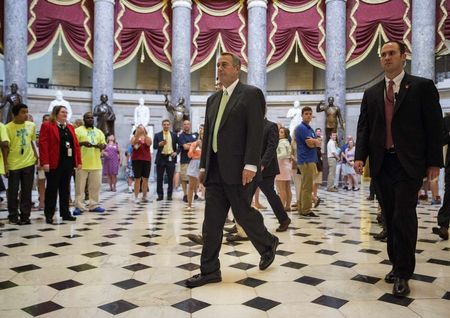By David Lawder and Richard Cowan
WASHINGTON (Reuters) - Republicans in the U.S. House of Representatives voted on Friday to crack down on Central American migrants, including unaccompanied children, who are flooding to the U.S. border with Mexico, as lawmakers passed a $694 million border security bill.
The 223-189 vote came one day after conservative Republicans balked at an earlier version of the measure, exposing a deep rift between Tea Party activists and more mainstream Republicans.
In passing the retooled bill, the Republican-led House ignored a veto threat from the White House. But with the Senate already on a five-week summer recess, this measure will advance no further at least until September.
"We couldn't go home (for recess) and not have a decision," said Representative Kay Granger of Texas, who helped draft the original bill.
Granger said the measure would serve as a marker for negotiations in September to resolve the humanitarian crisis that has seen nearly 60,000 children from El Salvador, Honduras and Guatemala arrive illegally since October to escape criminal drug gangs and poverty.
House Democrats complained that the legislation would too speedily return children to dangerous conditions in their home countries. President Barack Obama called the Republican bill "extreme" and "unworkable."
Later on Friday, the House also passed a separate bill reversing Obama's 2012 policy suspending deportations of some undocumented residents who were brought to the United States as children years ago by their parents.
The measure also would bar Obama from expanding this policy, possibly to parents of children who already qualify.
The tougher language in the twin bills would make it easier to deport migrant children and add money to deploy National Guard troops at the border with Mexico.
The changes were intended to satisfy conservative House Republican lawmakers who withdrew their support on Thursday amid a revolt instigated by Senator Ted Cruz, the Tea Party firebrand from Texas.
On Thursday, the Democratic-controlled Senate failed to advance its own $2.7 billion border funding bill, as Republicans lined up to stop it on a procedural vote.
With Obama's $3.7 billion border funding request rejected by Congress, but no alternative legislation presented to him for signing into law, Obama said he would shift funds from other accounts to pay for enhanced border security and the care and feeding of thousands of detained migrant children.
"I'm going to have to act alone because we don't have enough resources," Obama told reporters. "We've already been very clear. We've run out of money."
Friday's action capped a day of bitter debate over U.S. immigration policy.
With the two votes, the House went on record in favor of accelerating the return of children to their home countries while also reversing much of Obama's two-year-old policy that suspended deportation efforts against children brought to the United States illegally by their parents before mid-2007.
The measure would prohibit those who have already been given a reprieve from deportation from renewing their status when it expires after two years.
The child migrant crisis has become an increasingly hot topic ahead of the mid-term elections in November that will determine control of Congress next year.
The Republicans have been trying to present a united front against Obama to energize the party's voting base, including a move this week to sue him in federal court for allegedly overstepping his legal authority.
Republicans may have papered over their differences for now, but they could resurface after the summer break when negotiations intensify.
Boehner in September will have two hot-button issues to navigate through the House: a return to the border funding issue and a stop-gap spending bill to keep government agencies open in the new fiscal year starting on Oct. 1.

This week's dust-up in the House also may give Democrats a new opening to remind voters - and Democratic donors - of the Tea Party's influence over Republicans.
They attacked the revised Republican plan as putting at risk the children of undocumented immigrants, often known as "dreamers," who have grown up in the United States. The Republican push could aggravate immigrant communities that have been hoping for comprehensive reforms.
(Additional reporting by Mark Felsenthal; Editing by Doina Chiacu, Bill Trott, Frances Kerry and Ken Wills)
